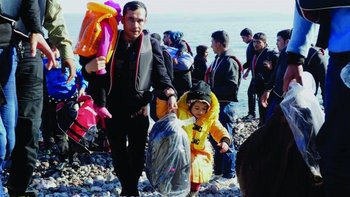The devastating war in Syria has seen more than 3 million people displaced to neighbouring countries (with millions more internally displaced inside Syrian borders). These refugees have predominantly ended up in towns and cities. The international community’s humanitarian response has therefore focused on these urban areas – with varying degrees of success.
Given the scale of this crisis and the resources needed to address urgent needs, it’s worth taking a moment to ask: could we be more effective if we were armed with better evidence to support our policies for urban displacement? What benefits, for example, might there be for host communities if refugees had freedom of movement and access to work? What if operational humanitarians on the ground responding to these challenges were able to engage more in the development of policy?
These were just some of the ideas being discussed at the International Rescue Committee’s (IRC) annual policy conference at Ditchley Park in October 2014. "The Future of an Urban Response to Humanitarian Needs” brought together a range of actors from the humanitarian, development, donor and private sectors to discuss how we move towards a more effective urban response. Discussions focused around creating an enabling policy environment, area-based approaches and scalable interventions.
The discussion kicked off with IRC’s president, David Miliband, challenging participants with the assertion that the international humanitarian system has failed to sufficiently adapt to the changing nature of humanitarian crises in urban settings. He noted that we are still struggling to understand what we really mean by serving the host population and asked how we ensure our interventions are sustainable and whether we need to engage with local politics.
In the opening panel, UNHCR emphasised that the recently released UNHCR Policy on Alternatives to Camps states that camps have become a last resort – again highlighting the need for effective adaptation to urban contexts. But how can these challenges and welcome policy shifts be transformed into concrete action and real change on the ground?
Solutions and emerging evidence
Over the course of the two days, several solutions became clear. Participants recognised that humanitarians need to better engage with policymakers, but also that this engagement needs to be evidence-based. We particularly need to build the case on the economic benefits that given freedom of movement and access to economic opportunities refugees can bring to host communities.
Moreover, there needs to be stronger coordination both within the humanitarian community and with other non-humanitarian actors and host governments. Humanitarians need to better engage with key bodies such as the World Bank to facilitate their advocacy for the economic lives of displaced communities.
We also need to engage urban planners around preparedness to ensure urban centres are better able to respond to stress and shock caused by the impact of displacement. Moreover, we need to better partner and engage with the private sector for scalable solutions and to gain insight from their expertise in large scale product delivery and service efficiency.
As we look ahead to the World Humanitarian Summit and its focus on ‘humanitarian effectiveness’ we need to focus much more on the opportunities the urban space presents, in particular the enormous potential offered by cities and refugees themselves.
There are welcome research investments being made to better understand what these opportunities could look like, given the right policy environment. The University of Oxford’s Refugee Studies Centres ‘Refugee Economies’ research is one such example. Their research challenges the myth that refugees are only ever an economic burden to the host state, with an evidence base that refugees in Uganda are active economic actors as customers, distributors and employers.
Moreover, IRC’s evaluation into cash programming ‘Emergency Economies: the Impact of Cash Assistance in Lebanon’, evidenced that cash programming had significant multiplier effects on the local economy with each dollar beneficiaries spent from cash transfers generating $2.13 of GDP back into the Lebanese economy (p6).
Evidence such as this enables us to at last shift the ‘burden v benefit debate’ to advocate for a facilitating policy environment wherein refugees are enabled to become self-sufficient with the right to earn a livelihood and no longer be required to depend on unsustainable humanitarian aid. This shift is particularly urgent in the urban context where markets, existing private sector and the labour market enable opportunities for economic activity and self-reliance to ensure that displaced population are a catalyst for change and sustainable development in their city of refuge.
